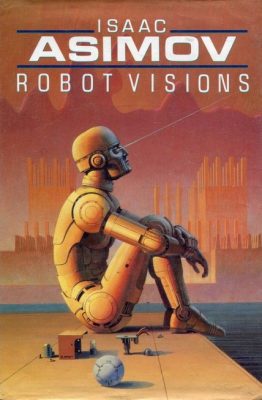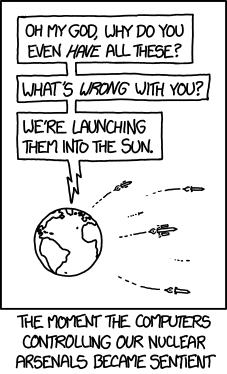Hi,
Artificial Intelligence has been one of those promising things that people have been talking about for some time.
I always somehow screw up the serious tone of my English tech blogs by dwelling too deep on some AI-related topic. The truth is, AI has been an interest of mine for a long time (those of you that are good with a search engine will be able to find my contributions to comp.ai.philosophy from about 20+ years ago) and I still have some ideas about it that I wish I had time to put into code.
 There is a lot of mysticism online related to artificial intelligence. For a lot of people it’s little more than a science fiction level fascination and you can immediately tell this is the case based on their persistent and senseless recycling of Asimov’s laws, which originate from 60’s science fiction and are not applicable and never will be applicable to any real-world software program. I am not one of those people. I view AI from the perspective of a software developer and there is no place in my understanding of AI, for overly vague abstractions that are made up and have no translation in real life machine code.
There is a lot of mysticism online related to artificial intelligence. For a lot of people it’s little more than a science fiction level fascination and you can immediately tell this is the case based on their persistent and senseless recycling of Asimov’s laws, which originate from 60’s science fiction and are not applicable and never will be applicable to any real-world software program. I am not one of those people. I view AI from the perspective of a software developer and there is no place in my understanding of AI, for overly vague abstractions that are made up and have no translation in real life machine code.
It is probably no secret that I work as in IT. Few lines of work make it as obvious, that there are routine tasks that machines are good at — and creative tasks that machines suck at and need a fallible organic operator to get them done. Such tasks are a core element of maintenance of any large scale system in use today. The goal of creating AI is automating the latter in a way that machines can understand the problems and solve them creatively.
Today’s AI is not quite there yet. I mean, today’s AI is far more than anything dreamed up in the 60s. Big companies like Google and Facebook figured out long ago that humans are not very good at understanding their role in social groups, when the number of people exceeds about 100 members. Google’s AI is a hivemind superintelligence that connects people using automation and… figures out what news items and Youtube videos you’ll be interested in. I have no doubt that some of you who use their services realised by now that it seems to figure out what you really needed in a day or so. Somehow.

But that AI is still not quite the understanding problem solver I was looking for, for my IT jobs. That being said, I do believe that we have the technology to make such an AI a reality. Presently, the problem is mainly that nobody has yet figured out how to make money from constructing a real AI. I don’t know if there is a business model to support the creation of a true AI, other than aiming to make a company with the explicit intention of inflating enough buzzwords to end up being brought out by Google and earning a fortune that way. Jokes aside, I think if there was commercial interest in creating a true AI, we’d have one by now.

My reasoning is primarily that.. I think I know how to make one. And since Randall manages to implement things I’ve thought about into comics so well, I think hundreds of other people just like us must be thinking about the same solutions as well. This means there probably already is a critical mass of developers out there who could make an AI if they put their minds to it.
The most promising piece of code that I have seen thus far was a trivial chatterbot created by a friend several years ago, who had intended to make it capable of learning a language. He allowed the bot to create a database of words in which words were no longer mere words, but abstractions. If you put the idea that the database has to make sense to you as the developer out of your head, you would have been able to see that the bot demonstrated some kind of rudimentary “true understanding” of the meaning behind the words. I think this concept, expanded to relate to observations and reenactments more functional than mere words, could be an AI capable of understanding a problem, which could then potentially be wired to try to solve said problem, based on observed solutions. And potentially it could be made capable of linking up simpler solutions into more complex ones, in other words: It could be made to solve problems independently.
The point that this does not seem impossible is… fascinating. I have been toying with the idea of simply sacrificing some of my free time to work on such an AI, on and off for the last few years. I want to work on it but… I’m not enough of a hardware robots guy to be capable of putting such an AI into a practical environment it could learn from as humans do (by connecting words to things we see and experience). I also lack certain skills in maths, which would help me make things like efficient poly-dimensional searches, which are required for efficient processing of learned abstractions from multiple aggregated inputs.

What got me writing this post was the idea I had last, that I might after all be able to create an AI that can creatively solve networking problems. Networking as it so happens is pretty native to computers and it would not be outside my skill set to set it up like that. I’d still face problems like how to set up an environment in such a way that problem solving would actually be an advantage over some more brute force approach. But at the very least it’s something where solutions could be taught and then demonstrated. There is potential.
I’m still not really sure why I write these blogs, given the likelihood that nobody will ever read them. Still, if other people are thinking as I am on this, there is a nonzero chance that someone will find some advantage or encouragement in reading what my thoughts on the subject were, I suppose.
Good luck. 🙂
LP,
Jure
The short article composed by you was such an enormous worth for me. I have got much information from this article which are not available at any of the blogs out there. Composing on such a subject calls for a great deal of understanding as well as info. I might clearly see the understanding in this article. I thank you from the bottom of my heart for such this post and aiding a lot of individuals like me.